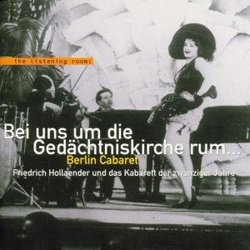| All Artists: Hollaender, Dietrich Title: Rund Um Die Gedachtniskirche Members Wishing: 1 Total Copies: 0 Label: Berlin Classics Release Date: 10/27/2008 Genres: Pop, Classical Styles: Vocal Pop, Symphonies Number of Discs: 2 SwapaCD Credits: 2 Other Editions: Berlin Cabaret UPC: 4009880145326 |
Search - Hollaender, Dietrich :: Rund Um Die Gedachtniskirche
 | Hollaender, Dietrich Rund Um Die Gedachtniskirche Genres: Pop, Classical
|
Larger Image |
CD DetailsSimilar CDs |
CD ReviewsSinging into the Third Reich. Steven Schwartz | Austin, TX USA | 02/18/2008 (5 out of 5 stars) "German cabaret (or Kabarett in German, with the final t's sounded) began roughly around the turn of the century, inspired largely by the French model. However, it didn't get going until just after the First World War, with the great director Max Reinhardt's groundbreaking production Schall und Rauch ("sound and smoke"). It turned the world of German popular entertainment, at that point dominated by operetta and vaudeville-revue, just about upside-down. The new cabaret was intellectually sophisticated, sharply satirical, and socially critical, almost exclusively from the left, occasionally from the extreme wing. Mainly, it offered a liberal critique. Nazis or bourgeois conservatives, for example, didn't create cabaret.
At its best, cabaret subverted the conventions of popular song. Instead of endless variations on boy meets girl, for instance, very often its political content turned things on their head. We all know the genre of the femme fatale whom all the boys run after. In Alfred Lichtenstein and Friedrich Hollaender's "Lene Levi," Lene runs trying to escape from a gang of rapists and finally commits suicide by jumping off a bridge. Those sensitive to names will realize that Lene Levi is a Jewish girl and her attackers are non-Jewish toughs, who at the end "run clear out of the neighborhood." The issues that the newspapers won't talk about, cabaret will. In Julian Arendt and Otto Stransky's "Ich steh auf dem Boden der Tatsachen," a man and his wife are accosted by a masher, who gives the man's wife the eye. The man asks the ruffian to move along, to little avail. "He was bigger and stronger than me." So the man himself walks off. He confides to the audience, "A heavyweight is hard to deal with. After all, it's my own private affair. Right? I ask you." It turns out that the wife resents the masher's attentions and breaks his nose. The little man runs up to his wife and taunts the retreating masher, "You coward, you!" Despite his protest that he's not at all political and prefers peace and quiet, the little man then proudly tells us how he was, in the days of the Kaiser, all for the Kaiser, at the rise of the Communists, a man of the left. With Il Duce, he turned fascist, and now of course he's all for the Third Reich. "After all, it's my own private affair. Right? I ask you." From the beginning, actors, not singers, were its stars. It never produced a voice on a par with Sinatra or Clooney, although occasionally you could find a good voice like Trude Hesterberg ("The Wild Trudy") or Lea Seidl. The stars not only knew their way around a stage, they could also, like Groucho Marx or Maurice Chevalier, act with their singing voices. A lot of composers wrote for cabaret, but its Schubert and Mozart all in one has to be Friedrich Hollaender, who enjoyed a run of popular Schläger ("hits") unparalleled in German popular music. People outside Germany probably know him best as the screen composer of The Blue Angel and The 5,000 Fingers of Dr. T, but he has a far more complex history. At any rate, cabaret songs were such the rage that they inspired hard-core classical composers like Weill, Eisler, Grosz, and even Schoenberg to try their hand at the genre. This is where, among other works and down to the present day, Threepenny Opera and Blitzstein's Cradle Will Rock come from. The artsy side of things took the vitality of cabaret and also gave the genre a second wind, and you get here such stalwarts as Ernst Busch, Lotte Lenya, and Marlene Dietrich. The Nazis, of course, closed all this down, since they often received and deserved the satirical scorn of cabaret. Some of the bright lights managed to escape. Many perished in concentration camps. This wonderfully generous collection (44 tracks) nevertheless is aimed at hard-core, German-capable fans. Neither the terrific liner notes (uncredited, but probably by producer Volker Kühn) nor the lyrics come in translation, and there's a lot of Berliner slang and dialect besides. If you can get around that, you're in for a huge treat, including Paul Graetz doing Hollaender's "Wenn der alte Motor wieder takt" and "Heimat Berlin," Blandine Ebinger with Hollaender's "Oh Mond," Willi Prager in Spoliansky's scathing "Ich weiß, das ist nicht so," Lenya with Weill and Brecht's hair-raising "Seeräuber Jenny," Dietrich with Hollaender's "Jonny" and "Ich bin von Kopf bis Fuss," Trude Hesterberg in Heymann's "Das Leibregiment," and Ernst Busch with Eisler's "Lied der Arbeitslosen (Stempellied)." Most of these people have a large dramatic range. Even Blandine Ebinger, known for her character of the naive shopgirl, can also play much grittier in Hollaender's "Die Trommlerin als Schiessbudenfigur." Those who know only Lenya's later nicotine croak might be surprised by her youthful chirp, but not by the depth of her performance. Nevertheless, one also comes across the occasional "one-note," or pure pop artist. Dietrich is probably the best-known, the naughty, knowing sex goddess, but Dietrich, even at this early date, is obviously a star with a product that doesn't outstay its welcome. Her performances leap out at you. At the beginning of her career, she's nevertheless a classic. For original shellac, this stuff is in amazing shape. One does hear a more or less constant crackle, but one also hears these voices very close to what they might have been like in life. And, of course, the performances are generally stellar." |

 Track Listings (22) - Disc #1
Track Listings (22) - Disc #1


